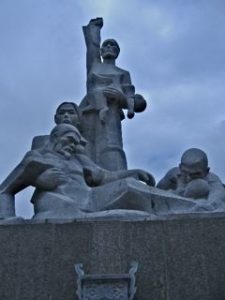 My Lai Memorial Son My, Vietnam
My Lai Memorial Son My, VietnamThe only US Army Officer convicted for involvement in the 1968 
 “My Lai massacre” has publicly apologized for his role in the Vietnam War-era killings.
“My Lai massacre” has publicly apologized for his role in the Vietnam War-era killings.
William L. Calley, now 66, was convicted in 1971 by court martial for the killing of 22 civilians in My Lai and My Khe hamlets of Son My village, during which approximately 400 unarmed men, women and children were killed.
Calley’s Battalion had been ordered into Son My village to find Viet Cong soldiers that US Army intelligence had reported were hiding there following their retreat after the January 1968 Tet Offensive.
No Viet Cong soldiers or weapons were found and the Americans never came under fire; but women, children and the elderly were nonetheless killed, houses were burned, and livestock mutilated. The entire episode was photographed by Ronald L. Haeberle, an Army photographer assigned to Charlie Company in My Lai (Bravo Company in My Khe committed similar acts) to record what the Army had thought would be an important battle.
Instead, the graphic images of woman and infants being shot and US soldiers holding lighters to homes – released to LIFE magazine after journalist Seymour Hersh reported on the massacre a year later – shocked the American public and are often cited as responsible for turning opinion against the war.
A handful of soldiers notably refused to take part – for example pilot Hugh Thompson landed his helicopter between fleeing villagers and the American soldiers, telling his crew to open fire at the soldiers if they advanced on the civilians.
But while most soldiers present participated in the crimes only 26 were eventually charged – and only Lt. Calley was brought to trial and found guilty. He served, under house arrest, three and a half years of a life sentence.
“There is not a day that goes by that I do not feel remorse for what happened that day in My Lai,” Calley has admitted to a small public gathering, “I feel remorse for the Vietnamese who were killed, for their families, for the American soldiers involved and their families. I am very sorry.”